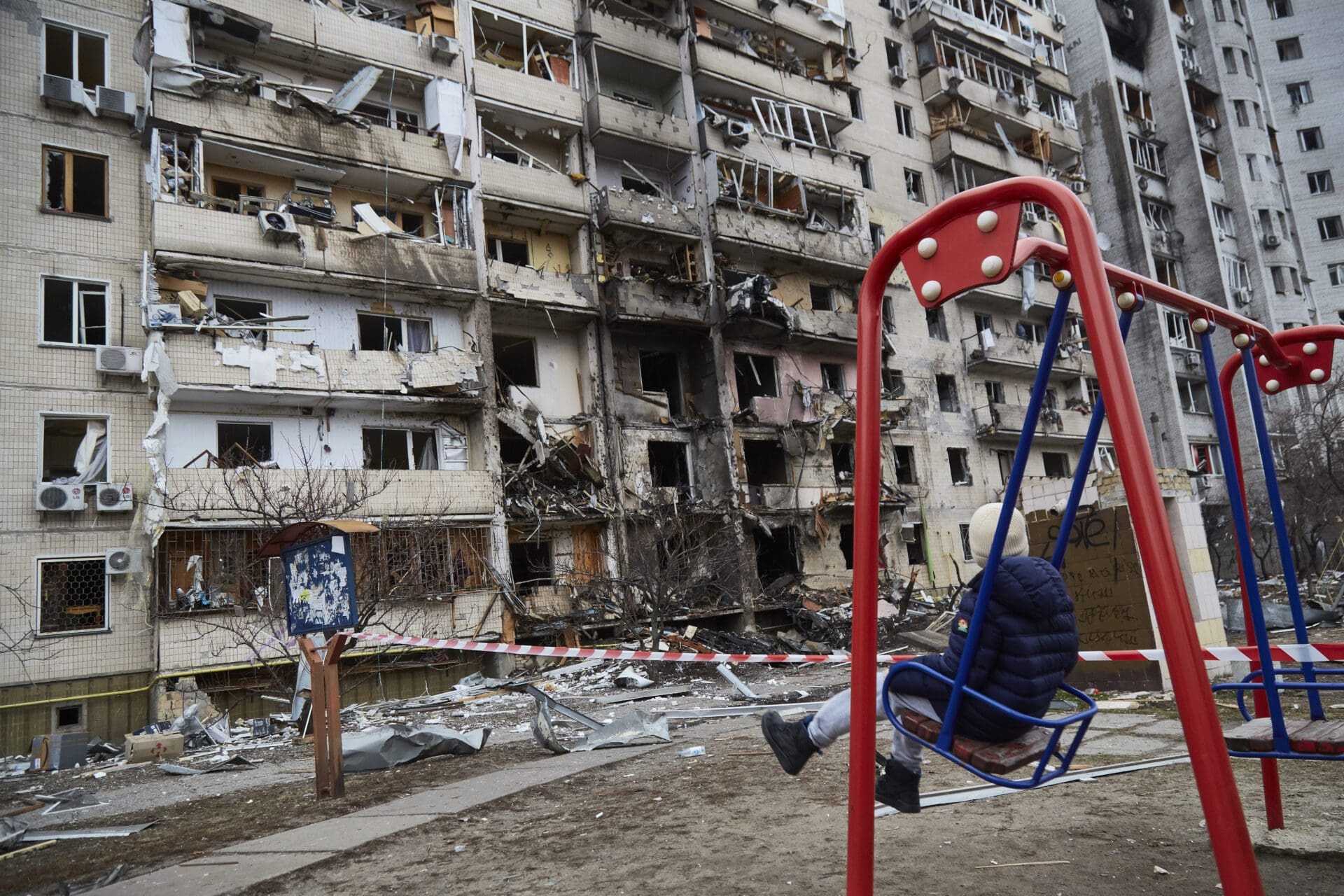 HUMAN RIGHTS ON CAPITOL HILL
HUMAN RIGHTS ON CAPITOL HILL
Table of Contents
Featured
International Updates
Domestic Updates
Amnesty Updates
march 2022 NEWSLETTER
This month’s edition of Human Rights on Capitol Hill focuses on Russia’s invasion of Ukraine—a manifest violation of the United Nations Charter which prohibits the use of force against the territorial integrity or political independence of any state. Since the Russian invasion began on Feb. 24, Amnesty International has documented the escalation in violations of humanitarian and human rights law, including deaths of civilians resulting from indiscriminate attacks on civilian areas and infrastructure. Amnesty urges the U.S. and UN member states to stand together in condemnation of Russia’s crimes of aggression and to provide relief and assistance to the Ukrainian people.
For Amnesty updates on Ukraine, please contact Eurasia Advocacy Director Daniel Balson ([email protected]; @DanBalson).
Finally, this newsletter will be my final one as Amnesty’s National Director of Advocacy and Government Affairs. Going forward, please contact Tarah Demant ([email protected]), Interim National Director for Programs, Advocacy, and Government Affairs.
It has been an honor and pleasure working with you to advance and protect human rights—in Ukraine, Xinjiang, Afghanistan, Tigray, Hong Kong, India, Yemen, Myanmar, and right here at home.
Onward!
Joanne Lin
National Director
Advocacy and Government Affairs
Amnesty International USA
Featured: Russian Invasion of Ukraine
 A child on a swing outside a residential building damaged by a missile on Feb. 25, 2022 in Kyiv, Ukraine. (Photo by Pierre Crom/Getty Images)
A child on a swing outside a residential building damaged by a missile on Feb. 25, 2022 in Kyiv, Ukraine. (Photo by Pierre Crom/Getty Images)
Russia’s invasion of Ukraine is a manifest violation of the United Nations Charter and an act of aggression that is a crime under international law, said Amnesty International as it called for all those involved in this crime to be held accountable for those violations.
Russia’s multi-pronged attack has been marked by indiscriminate attacks on civilian areas and strikes on protected objects such as hospitals. Amnesty International’s Crisis Evidence Lab has already verified 13 incidents that it believes to have killed civilians including children. In one such incident, a preschool in north-eastern Ukraine was hit on the morning of Feb. 25 with widely-banned cluster munitions while civilians took shelter inside, killing three of them, including a child, and wounding another child.
Russian troops should immediately stop carrying out indiscriminate attacks in violation of the laws of war. The continuation of the use of cluster munitions, ballistic missiles, and other inaccurate explosive weapons causing civilian deaths and injuries is inexcusable.
We note with appreciation the U.S. government’s previous efforts to speak out against human rights abuses by Russian authorities in occupied Crimea, by pro-Russian separatists in Eastern Ukraine, and also by the government of Ukraine. Still, given the gravity of the situation, Amnesty calls for further measures to protect human rights in Ukraine.
Amnesty International is calling on Congress and the U.S. government to:
- Ensure the State Department’s public statements about the situation in Ukraine prioritize the risk to human rights.
- Identify individuals who may face retaliation for peaceful activism and, if necessary, facilitate their safe exit out of Ukraine.
- Dedicate additional support for members of vulnerable minority groups likely to face discrimination and abuse at the hands of Russian officials, including LGBTI Ukrainians and Jehovah’s Witnesses.
- Work with close international partners to secure support for a robust monitoring mission that documents human rights violations in the event of further conflict.
- Continue to push for accountability for human rights violations in the Crimean Peninsula and in separatist-controlled Eastern Ukraine.
- Surge resources to Ukrainian civil society including organizations providing public health assistance, monitoring violations of human rights, fighting corruption, and engaging in other worthy causes. In the face of the ongoing conflict, their work is more needed than ever, and their staff is facing unprecedented risk.
- Work with partners across Europe and humanitarian organizations to ensure appropriate resources are in place for refugees moving out of Ukraine.
- Designate Ukraine for Temporary Protected Status (“TPS”) or Deferred Enforced Departure (“DED”) and Special Student Relief (“SSR”). It is currently impossible for Ukrainians in the United States to safety return to Ukraine, and this critical protection will ensure that those within the U.S. can remain here until conditions in the country make a safe return possible.
Read Amnesty’s Feb. 16 letter to Deputy Secretary of State Wendy Sherman for our full list of recommendations. For more information, please contact Daniel Balson at [email protected].
international UPDATES
eurasia
AFGHANISTAN
As Afghans face an economic collapse of historic proportions, more must be done to alleviate the suffering. Rising food prices, devaluation of the currency, and dwindling foreign aid have led to a humanitarian catastrophe. Afghans are hungry and dying for entirely preventable reasons. Children are facing malnourishment and access to clean water is scarce.
Amnesty has long advocated for compensation to survivors, victims, and victims’ families of the September 11 attacks. We have been clear that individuals directly impacted by the attacks deserve compensation and justice. The perpetrators of the horrific attacks and anyone who sponsored them must face accountability. The $3.5 billion of Afghanistan’s frozen assets recently diverted by the Biden administration to compensate victims’ families, however, do not belong to the Taliban. They are the property of the people of Afghanistan. And many of these people are today going without food.
In our Feb. 18 brief, Amnesty International USA lays out the scope of the problem and provides concrete steps that U.S. officials must take to address the crisis. Our recommendations are designed to be specific and include calls for releasing humanitarian aid, rebuilding Afghanistan’s financial capacity, and supporting humanitarian organizations.
AFGHANS IN THE U.S
If Congress doesn’t act, Afghan evacuees who were granted humanitarian parole in 2021 will be hitting the one-year asylum filing deadline where they will enter an asylum backlog of over 600,000 or lose their opportunity to seek asylum in the United States. The Afghan Adjustment Act, patterned after similar legislation after the Cuban Revolution, the Vietnam War, and Operation Iraqi Freedom, offers an important correction by allowing Afghan evacuees to apply to become lawful permanent residents. We strongly encourage you to support the Afghan Adjustment Act’s inclusion in the FY22 Omnibus by immediately reaching out to leadership and pushing for its inclusion.
Lawmakers should also echo Amnesty and over 200 organizations’ call on the Biden administration to establish an Afghan Parole Program. An Afghan Parole Program would acknowledge and address the urgent and exigent needs for protection for certain at-risk Afghans who cannot wait years for refugee processing to be established in meaningful way, and for families who have endured the trauma of separation in the midst of the Taliban’s takeover of Afghanistan.
turkey
On Feb. 16 Turkey Advocacy Specialist Deniz Yuksel testified at a U.S. Helsinki Commission briefing on human rights and foreign policy in Turkey. Her testimony detailed Turkey’s worsening human rights crisis, including the government’s weaponization of the judicial system, its crackdown on dissenting voices, and efforts to criminalize human rights defenders. Amnesty calls on the U.S. government to adopt a consistent, comprehensive, and whole-of-government approach to Turkey which centers human rights. Click here to watch the hearing. Read Deniz’s written testimony here.

Amnesty’s Deniz Yuksel testifies before the U.S. Helsinki Commission on Feb. 16
mid east
egypt
On Feb. 16, Amnesty International joined 18 organizations in calling on Egyptian authorities to release Salah Soltan, father of exiled Egyptian activist and U.S. resident Mohamed Soltan. Salah has been detained since September 2013 and denied crucial medical care in an apparent reprisal for his son’s advocacy in the U.S. U.S. laws bar arms transfers to governments committing human rights violations broadly, including acts of intimidation and harassment against U.S. residents. The U.S. government must press Egypt to end acts of transnational repression aimed at silencing Egyptian human rights defenders abroad. Congress should act to maintain House-passed increased restrictions on military aid to Egypt and require a report on Egypt’s transnational repression against U.S. residents in FY22 spending bills.
asia
china
Amnesty welcomed the Feb. 3 Congressional-Executive Commission on China (“CECC”) hearing on “The Beijing Olympics and the Faces of Repression,” which uplifted stories of prisoners of conscience and included the testimony of Speaker Pelosi (D-CA). We urge lawmakers to join the CECC in calling for the release of those arbitrarily detained and tortured by Chinese authorities, including by making public statements in support of the prisoners of conscience highlighted in Amnesty’s #FreeTheFive campaign. For more on this issue read Amnesty’s Rowan Sockwell in Geopolitical Monitor.
thailand
Thailand’s heightening crackdown on civil society demands a response from U.S. congressional leaders. If passed, Thailand’s proposed NGO law will expand legal authority to restrict all non-profit organization activities, jeopardizing the work of NGOs and civil society across the country, including Amnesty. The law has already been widely condemned by Thai civil society. U.S. lawmakers must join in solidarity with these organizations and urge the State Department to insist that the NGO law does not enter Thailand’s parliament in May and that the Thai authorities end their crackdown on civil society.
Security with Human Rights
LETHAL FORCE
Amnesty International USA submitted a statement for the record for a Feb. 9 Senate Judiciary Committee hearing on “The Legal and Human Costs of 20 Years of U.S. Drone Strikes.” We urge Congress to continue to ensure the U.S. government abides by international law in its use of lethal force and takes more effective measures to protect civilians from harm and to investigate and respond humanely to civilian casualties. Click here to read the statement.
domestic updates
SENATE MUST REAUTHORIZE VIOLENCE AGAINST WOMEN ACT
Reauthorization for the Violence Against Women Act (“VAWA”), which funds most programming and services in the U.S. to combat sexual and domestic violence, has been stalled in the Senate, threatening services to survivors across the country. Amnesty urges the Senate to support the bill (S.3623) and push for its quick passage, reaffirming the United States’ commitment to women’s right to live free from violence.
U.S. GOVERNMENT MUST ADDRESS ONGOING MISTREATMENT OF BLACK MIGRANTS
Amnesty thanks Rep. Bush (D-MO), Sen. Booker (D-NJ), and over 100 members of Congress for their Feb. 16 letter to President Biden calling on his administration to undo draconian immigration policies like Title 42 and conduct a review of the disparate treatment of Black migrants throughout our immigration system.
Elected officials committed to advancing racial justice and rooting out systemic racism must act now. All members of Congress must press President Biden, Secretary Blinken, and Secretary Mayorkas to:
- Stop deportations to Haiti and all Title 42 expulsions: Since September 2021, the U.S. has deported over 15,000 Haitians to a country reeling from widespread gang violence, political crisis, food insecurity, a health system on the brink of collapse, and devastation from the 2013 and 2021 earthquakes.
- Free people from ICE custody: Black asylum-seekers are disproportionately detained during immigration proceedings and have endured prolonged and unnecessary detention; racist and xenophobic abuse; denial of medical, including mental, health care; disproportionately use of force; and prolonged solitary confinement.
- Designate TPS for Cameroon: TPS would provide life-saving protection to over 40,000 Cameroonians living in the U.S. at risk of ill treatment, extreme violence, displacement and death if forcibly returned to Cameroon.
Amnesty Updates
AMNESTY INTERNATIONAL USA LOBBY DAY
During the week of Feb. 14, Amnesty International USA’s volunteer Legislative Coordinators met virtually with Congressional offices in support of the Afghan Adjustment Act and the Break the Cycle of Violence Act. Our Legislative Coordinators are a team of dedicated human rights advocates—ranging from high schoolers to retirees—who advocate for Amnesty’s priority legislative issues.
NEW AMNESTY AFRICA ADVOCACY DIRECTOR
 In February, Kate Hixon joined as Amnesty’s new Advocacy Director for Africa. She previously worked as the Senior Policy Advisor for Africa and UN issues at the British Embassy in Washington D.C. She has also worked at the United Nations Foundation, Freedom House, and the National Democratic Institute.
In February, Kate Hixon joined as Amnesty’s new Advocacy Director for Africa. She previously worked as the Senior Policy Advisor for Africa and UN issues at the British Embassy in Washington D.C. She has also worked at the United Nations Foundation, Freedom House, and the National Democratic Institute.
STAFFING UPDATES
After three years, Philippe Nassif, Middle East advocacy director, will be departing Amnesty International USA in March. Going forward, please contact Tarah Demant ([email protected]), Interim National Director for Programs, Government Relations and Advocacy.


